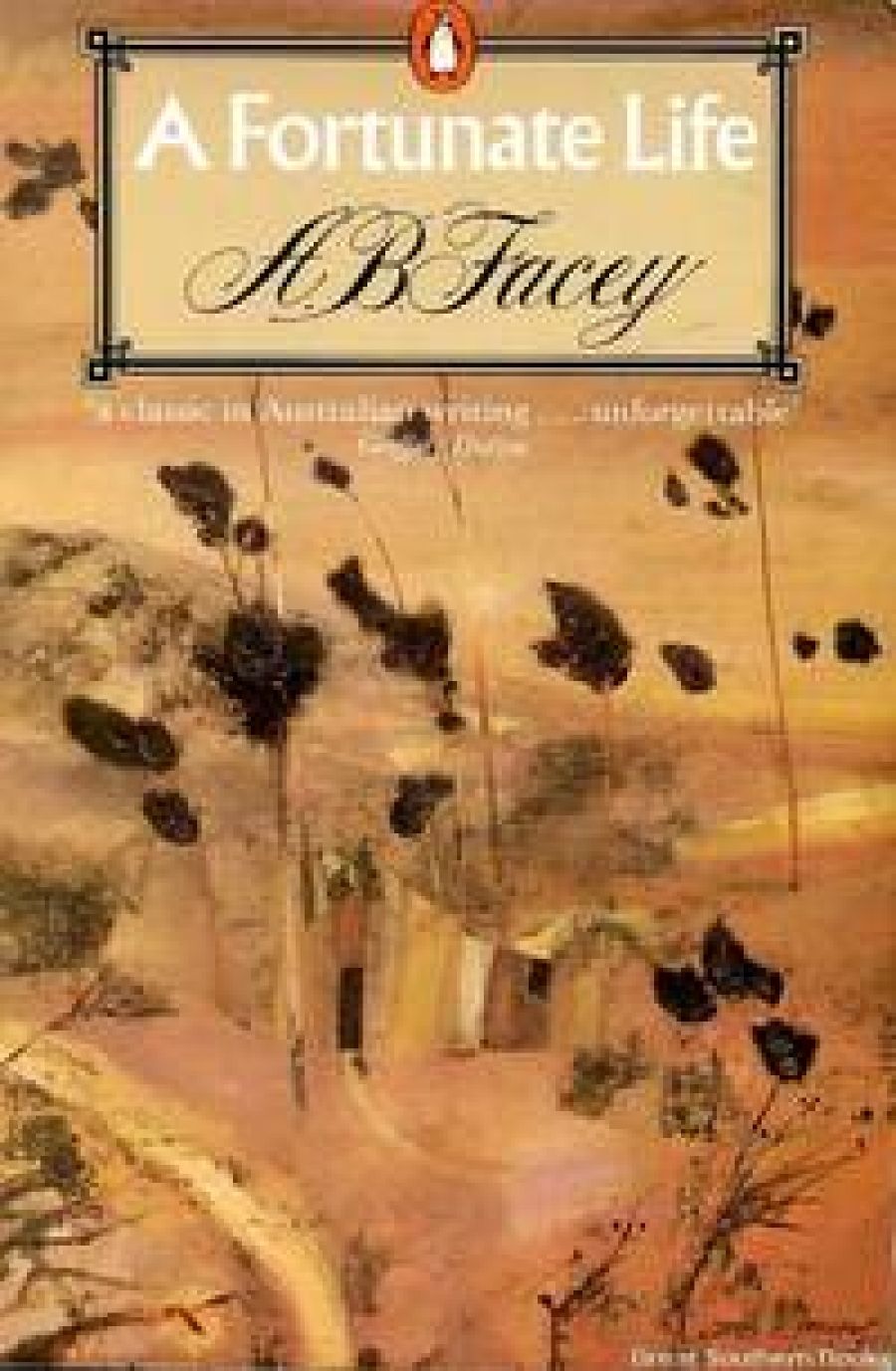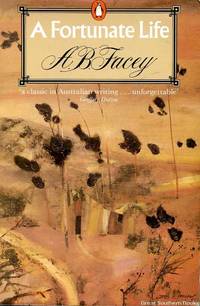
- Free Article: No
- Contents Category: Biography
- Review Article: Yes
- Article Title: An Enduring Classic
- Online Only: No
- Custom Highlight Text:
I am sure A.B. Facey intended no irony in calling his remarkable autobiography A Fortunate Life. He is at once too unassuming and, too serious for smart games with words though he does find humour sometimes among the grim and frightful events of his earlier years and, after his perfect marriage, there were times of fulfilment and true happiness. He has chosen to emphasise triumphs as well as struggles, and, while such brave qualities determine his title, they are also what make this chronicler a great man and his book a classic to equal Carolina Maria de Jesus’s Beyond all Pity. It surpasses anything else I know of to which it might be compared; even Shaw Neilson’s autobiography must yield before Facey.
- Book 1 Title: A Fortunate Life
- Book 1 Biblio: Fremantle Arts Centre Press, $22 hb, $12 pb, 340 pp
- Book 1 Cover Small (400 x 600):

The book is so full and detailed that how to convey its essence is a problem. I could write a whole article about Grandma (1832–1932) and Mother and other women, some cruel, some kind, whose pioneering hardships make up many, many pages. I could concentrate on important first-hand accounts of farm and manual labour and on farming techniques and improvements throughout this century, or on the Gallipoli campaign or on early trades union affairs in Western Australia. It is tempting to cast this article as an open letter to the Milton Friedmans, Ronald Reagans and Fraser governments of this world who preach that private enterprise and private charity alone can ensure that disadvantaged or young and helpless people will attain civil rights and social dignity. If I dwell overmuch on my appalled outrage at what could happen to a boy of eight in 1902 and thereafter, I may not give proper weight to his eventual ‘fortune’.
A.B. Facey was born in Victoria in 1894, the seventh child of a man who soon afterwards left with his two elder sons, then about ten and twelve, to seek his fortune on the Western Australian goldfields. He died of typhoid two years later. His destitute widow made a decision that sounds heartless, and seemed so to Facey throughout his youth, but her real tragedy was to have had little choice. She left her five younger children with her parents, went to the West to her elder boys, remarried (because there was no alternative) a man who declined to support her first family, had more children, and was considered grasping and unfeeling by her own mother.
Soon after this, Grandma was herself widowed and nearly destitute. She took four of the five remaining children to the West. There her daughter Alice and her husband Archie took them in and gave them a home with their, own three daughters. Grandma was then sixtytwo. Aunt Alice and Uncle Archie were struggling to create a farm from virgin country and the sheer goodness and great heart with which they accepted five extra people to feed has to be stressed. There were no pensions, no charities and even the youngest of the new arrivals worked, and worked hard. The children wore poor clothes; they had no shoes and burned their feet when they helped with burning-off operations, but they were well fed, greatly loved and happy.
As if she knew Bert Facey would soon be torn from her love and influence, Grandma taught him precepts of ethical, moral, and social behaviour that would govern his life thereafter. The break came when he was eight. A farmer from thirty miles away offered the little boy tiny wages and full keep in return for helping his mother with light farm work and keeping her company. Grandma and Uncle Archie understood the misery of the child’s misgivings, but persuaded him to take the job. Truly they had little choice. The man promised the child might return to his family if he were unhappy. They trusted the man and he was a liar.
His family was disreputable in every way and cattle stealers as well. The child was exploited, ill-treated, grossly overworked and practically not clothed. There was no one to whom he could complain. The few people who befriended him as best they could were illiterate and also dependent and frightened. To send a message was impossible and Bert lived like this for more than two years. Then one of the drunken men of the family whipped him so savagely with a stock-whip that he nearly died. His condition could no longer be completely hidden from neighbours. At last, when he was ten, he did contrive to run away and get home, shoe-less, across miles of uninhabited country, in terror of pursuit, frightened by dingoes, thirsty and starving.
Thereafter he had a succession of jobs on farms. Some of his employees were tolerably kind; others exploited him shamefully. All the same, he learned. By the time he was fifteen he was an excellent rifle shot, an experienced horseman and a thoroughly expert jack of nearly all rural trades and pursuits, and a desperately lonely boy, whose desire to learn to read and write overshadowed any other ambition.
Facey nearly perished twice more before he was twenty. At fifteen he was employed on a cattle drive (2000 head of cattle across 2,500 miles of Western Australia). During a cattle stampede in a violent storm Bert became separated from the other drovers and was lost for a week before a family of Aborigines rescued him when he was near death. At seventeen he was repairing a deep and dangerous old well whose sides caved in; he managed to get out just before the entire structure collapsed while his mates were away rustling up a rescue party that arrived expecting to find his corpse.
Whenever he nearly found a job offering training and advancement his illiteracy stood in his way. Some of his employees taught him a little and one gave him a treasure of old school books, but his condition of work and living seldom gave him time or opportunity to teach himself in any consistent way.
1914 saw Facey the winner of twenty-nine consecutive boxing bouts and travelling in New South Wales with a troupe of fighters. He was then six feet tall, weighed thirteen stone, had managed farms, built houses, lumped wheat bags, laid railway track. He returned to Western Australia to enlist in the army and fought in the Gallipoli campaign where two of his brothers were killed and he was badly wounded. In 1916 in Perth he was discharged from the army, awarded a pension, and told he might, with luck, live for two more year – he is now eighty-seven.
Nevertheless his fiancé agreed to marriage – their meeting was romantic, and their nearly sixty years of marriage were lastingly happy. He attended night school; worked for the tramway department first as a conductor and then as a driver; established a home and became actively involved with trades union causes and affairs.
Later again Facey farmed successfully and took immense pleasure in making a happy life for his wife and large family. The Depression ruined his farm and his plans but he and his family survived and Facey became a leader in community and local government affairs. One of his sons was killed on active service in New Guinea in World War II, and his beloved wife died in 1976.
The tape recorder and increasingly sophisticated oral history projects are enlarging the legacies that ‘obscure’ people can leave for future records. Even so the memories of elderly folk are often faulty or sieved and censored by time. One of the things that makes Facey’s book virtually unique is that he set down the greater part of his memoirs when he was still comparatively young and had detailed recall of his childhood and early manhood.
There is, I think, another factor. Intelligent but unlettered people often recall events with a clarity that seems mysterious to educated folk, as if they relive memories using a store of mental power that most of us dissipate as we learn, read, and stock our minds in different ways. The memories of custodians of oral literary traditions amaze scholars.
Be that as it may, A.B. Facey has written a book that is clearly destined to be an enduring classic. Certainly, its quality owes a great deal to excellent and sympathetic editing by its publishers; to fine production, illustration and maps. Robert Juniper’s beautiful cover enhances it. But essentially the lasting values of A Fortunate Life emerge simply and straightforwardly from the great heart of a fine Australian.


Comments powered by CComment